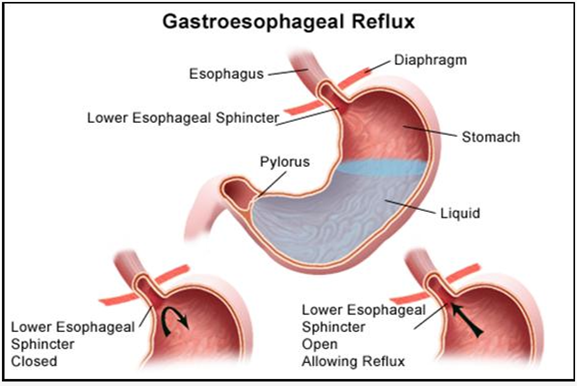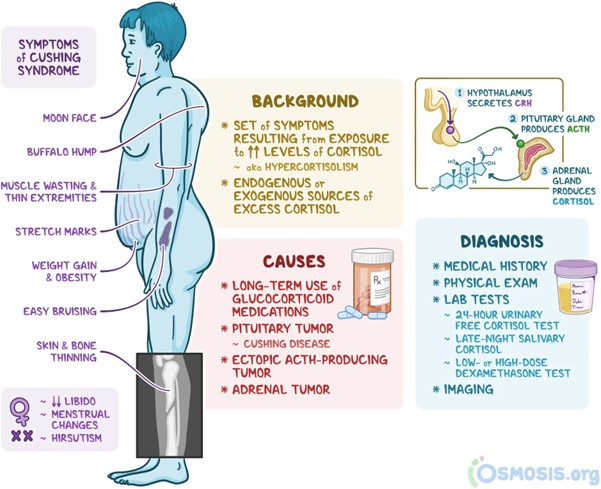The nurse is explaining the alteration in normal function to a patient recently diagnosed with gastroesophageal reflux disease (GERD). Which etiology contributing to GERD does the nurse include in the teaching session?
Incompetent lower esophageal sphincter.
Decreased pressure within the stomach.
Transient constriction of the lower esophageal sphincter
Prolonged constriction of the upper esophageal sphincter.
The Correct Answer is A
The lower esophageal sphincter (LES) is a muscular ring located between the esophagus and stomach. Its function is to prevent the backflow of stomach acid and contents into the esophagus. In GERD, the LES becomes weak or relaxed, allowing stomach acid to flow back up into the esophagus, leading to symptoms such as heartburn, regurgitation, and chest pain.

Nursing Test Bank
Naxlex Comprehensive Predictor Exams
Related Questions
Correct Answer is B
Explanation
Cushing's syndrome is a disorder characterized by excessive production or prolonged exposure to high levels of glucocorticoids, particularly cortisol. This can occur due to various reasons, such as the use of corticosteroid medications or overproduction of cortisol by the adrenal glands. Elevated glucocorticoid levels result in a variety of clinical manifestations associated with Cushing's syndrome, including weight gain, central obesity, muscle wasting, thinning of the skin, easy bruising, and impaired glucose metabolism.
It's important to note that Cushing's syndrome can have different underlying causes, such as adrenal tumors, pituitary tumors, or ectopic ACTH production. Regardless of the cause, the common feature in Cushing's syndrome is the excessive glucocorticoid levels, which contribute to the signs and symptoms of the condition.

Correct Answer is A
Explanation
Glipizide is an oral antidiabetic medication commonly prescribed to manage type 2 diabetes. It works by stimulating the release of insulin from the pancreas, which helps lower blood glucose levels. However, there is a risk of hypoglycemia (low blood sugar) with the use of Glipizide.
It is crucial for the client to be aware of the signs and symptoms of hypoglycemia so that they can take appropriate action if their blood sugar drops too low. These symptoms may include sweating, trembling, dizziness, confusion, weakness, and hunger. By recognizing these signs, the client can promptly address hypoglycemia by consuming a source of fast-acting glucose, such as fruit juice or glucose tablets, as instructed by their healthcare provider.
Whether you are a student looking to ace your exams or a practicing nurse seeking to enhance your expertise , our nursing education contents will empower you with the confidence and competence to make a difference in the lives of patients and become a respected leader in the healthcare field.
Visit Naxlex, invest in your future and unlock endless possibilities with our unparalleled nursing education contents today
Report Wrong Answer on the Current Question
Do you disagree with the answer? If yes, what is your expected answer? Explain.
Kindly be descriptive with the issue you are facing.
